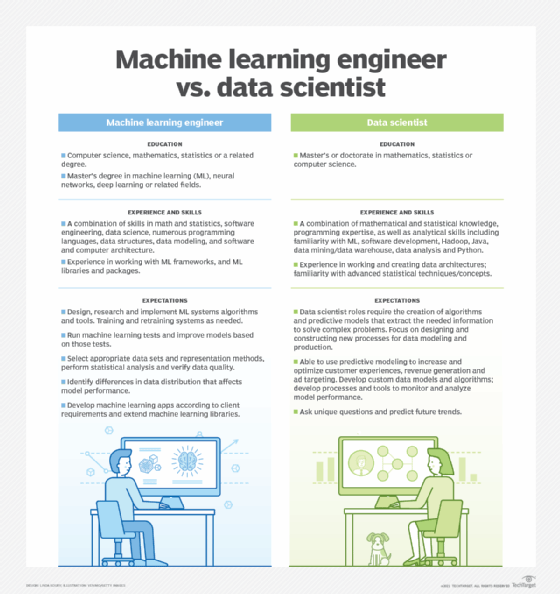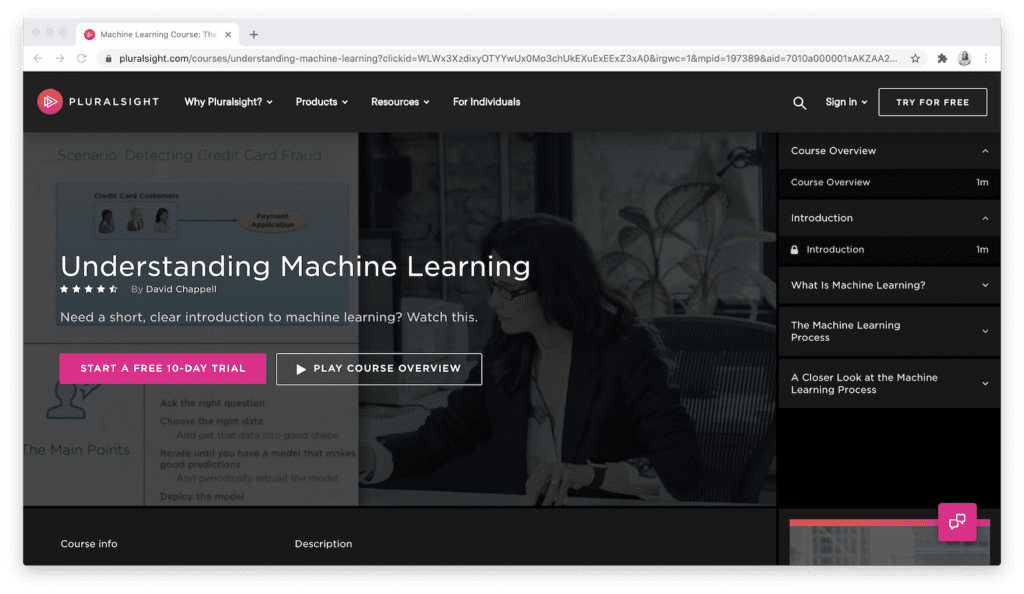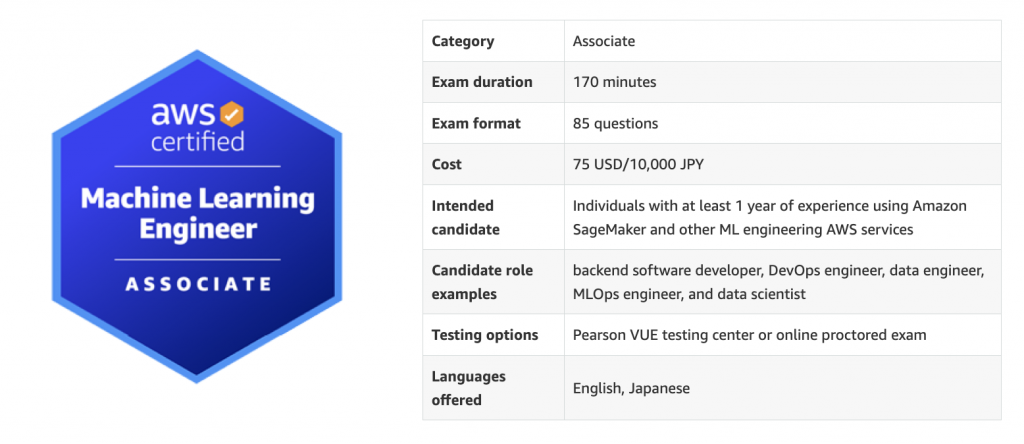All Categories
Featured
Table of Contents
My PhD was the most exhilirating and exhausting time of my life. Instantly I was bordered by people who might address hard physics inquiries, comprehended quantum mechanics, and might develop intriguing experiments that obtained published in top journals. I really felt like an imposter the entire time. I fell in with a good group that urged me to check out points at my own rate, and I invested the following 7 years discovering a lot of things, the capstone of which was understanding/converting a molecular characteristics loss function (including those shateringly learned analytic by-products) from FORTRAN to C++, and creating a gradient descent regular straight out of Numerical Recipes.

I did a 3 year postdoc with little to no device understanding, simply domain-specific biology things that I really did not locate fascinating, and finally managed to obtain a work as a computer system scientist at a nationwide lab. It was a good pivot- I was a principle investigator, meaning I could look for my own grants, compose papers, etc, but really did not need to teach courses.
Unknown Facts About Machine Learning Crash Course For Beginners
I still didn't "get" equipment learning and desired to function someplace that did ML. I tried to obtain a job as a SWE at google- went with the ringer of all the hard inquiries, and inevitably got turned down at the last action (many thanks, Larry Web page) and went to benefit a biotech for a year prior to I finally managed to get hired at Google during the "post-IPO, Google-classic" era, around 2007.
When I got to Google I quickly checked out all the tasks doing ML and located that than ads, there truly wasn't a great deal. There was rephil, and SETI, and SmartASS, none of which appeared even remotely like the ML I wanted (deep semantic networks). I went and focused on other things- discovering the distributed modern technology beneath Borg and Giant, and understanding the google3 pile and manufacturing environments, generally from an SRE viewpoint.

All that time I 'd spent on machine understanding and computer framework ... went to writing systems that filled 80GB hash tables right into memory so a mapper can compute a tiny part of some slope for some variable. Sibyl was actually a terrible system and I got kicked off the team for telling the leader the right way to do DL was deep neural networks on high efficiency computing equipment, not mapreduce on inexpensive linux collection machines.
We had the information, the algorithms, and the compute, simultaneously. And even better, you didn't need to be inside google to take benefit of it (except the large information, and that was changing promptly). I recognize sufficient of the mathematics, and the infra to lastly be an ML Designer.
They are under intense stress to get outcomes a few percent better than their collaborators, and after that once published, pivot to the next-next thing. Thats when I created among my legislations: "The best ML designs are distilled from postdoc tears". I saw a couple of individuals break down and leave the market completely just from servicing super-stressful tasks where they did magnum opus, yet only got to parity with a competitor.
Charlatan disorder drove me to overcome my charlatan disorder, and in doing so, along the way, I discovered what I was chasing after was not actually what made me delighted. I'm far more pleased puttering about using 5-year-old ML technology like item detectors to enhance my microscopic lense's capacity to track tardigrades, than I am attempting to become a popular scientist who uncloged the hard problems of biology.
9 Simple Techniques For Top Machine Learning Courses Online

Hi globe, I am Shadid. I have actually been a Software program Engineer for the last 8 years. I was interested in Device Discovering and AI in college, I never ever had the possibility or persistence to pursue that interest. Currently, when the ML area expanded tremendously in 2023, with the most current technologies in huge language models, I have a horrible wishing for the roadway not taken.
Partly this insane idea was also partially motivated by Scott Young's ted talk video titled:. Scott talks regarding how he completed a computer technology degree simply by complying with MIT curriculums and self studying. After. which he was also able to land a beginning setting. I Googled around for self-taught ML Engineers.
At this point, I am not certain whether it is feasible to be a self-taught ML engineer. I intend on taking training courses from open-source training courses available online, such as MIT Open Courseware and Coursera.
Some Ideas on Top Machine Learning Careers For 2025 You Should Know
To be clear, my objective here is not to construct the next groundbreaking design. I merely wish to see if I can get a meeting for a junior-level Maker Knowing or Data Design job hereafter experiment. This is totally an experiment and I am not trying to transition into a function in ML.

I intend on journaling concerning it regular and recording every little thing that I study. An additional disclaimer: I am not going back to square one. As I did my bachelor's degree in Computer Engineering, I comprehend some of the principles required to pull this off. I have strong history knowledge of single and multivariable calculus, straight algebra, and stats, as I took these courses in college concerning a decade ago.
Get This Report on How To Become A Machine Learning Engineer (2025 Guide)
However, I am mosting likely to leave out a number of these training courses. I am mosting likely to concentrate generally on Machine Knowing, Deep understanding, and Transformer Design. For the initial 4 weeks I am going to focus on ending up Machine Discovering Specialization from Andrew Ng. The objective is to speed up go through these very first 3 courses and get a solid understanding of the basics.
Since you've seen the training course referrals, here's a quick overview for your learning device learning journey. We'll touch on the requirements for most equipment learning training courses. Much more innovative training courses will call for the following knowledge before starting: Direct AlgebraProbabilityCalculusProgrammingThese are the general parts of having the ability to recognize how maker learning jobs under the hood.
The very first course in this list, Artificial intelligence by Andrew Ng, consists of refresher courses on a lot of the mathematics you'll need, yet it could be testing to find out equipment understanding and Linear Algebra if you haven't taken Linear Algebra before at the very same time. If you require to review the math needed, examine out: I 'd advise finding out Python because the majority of good ML courses make use of Python.
The Of Machine Learning Devops Engineer
Additionally, one more outstanding Python resource is , which has lots of complimentary Python lessons in their interactive internet browser atmosphere. After discovering the prerequisite fundamentals, you can start to actually comprehend exactly how the formulas function. There's a base set of algorithms in device knowing that everybody should be familiar with and have experience using.

The training courses listed over include essentially every one of these with some variation. Recognizing just how these strategies work and when to utilize them will certainly be crucial when handling new tasks. After the basics, some advanced methods to find out would be: EnsemblesBoostingNeural Networks and Deep LearningThis is just a beginning, but these algorithms are what you see in several of the most intriguing equipment discovering solutions, and they're sensible enhancements to your tool kit.
Understanding machine learning online is difficult and very gratifying. It is necessary to bear in mind that simply seeing video clips and taking tests doesn't indicate you're actually finding out the product. You'll discover much more if you have a side project you're dealing with that uses various data and has other goals than the training course itself.
Google Scholar is always a good area to start. Get in key words like "artificial intelligence" and "Twitter", or whatever else you have an interest in, and hit the little "Develop Alert" web link on the delegated obtain e-mails. Make it an once a week practice to check out those informs, scan with documents to see if their worth reading, and after that devote to recognizing what's taking place.
Unknown Facts About Machine Learning In Production
Equipment learning is unbelievably pleasurable and interesting to discover and try out, and I hope you discovered a course above that fits your very own journey right into this exciting area. Maker learning composes one element of Information Science. If you're also curious about finding out about stats, visualization, information analysis, and more make sure to take a look at the leading data science programs, which is an overview that adheres to a similar style to this.
Table of Contents
Latest Posts
The Best Courses For Full-stack Developer Interview Preparation
Software Development Interview Topics – What To Expect & How To Prepare
The Best Technical Interview Prep Courses For Software Engineers
More
Latest Posts
The Best Courses For Full-stack Developer Interview Preparation
Software Development Interview Topics – What To Expect & How To Prepare
The Best Technical Interview Prep Courses For Software Engineers